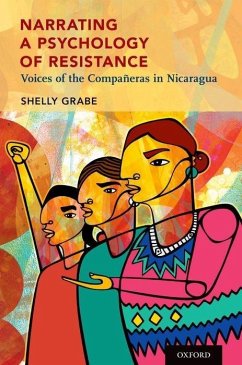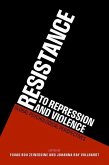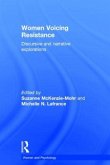- Gebundenes Buch
- Merkliste
- Auf die Merkliste
- Bewerten Bewerten
- Teilen
- Produkt teilen
- Produkterinnerung
- Produkterinnerung
Narrating a Psychology of Resistance analyzes first-hand testimony from the Movimiento Aut¿nomo de Mujeres in Nicaragua - a coordinated mobilization of women that has weathered unremitting power differentials characterized by patriarchy and capitalism - to examine the psychology of resistance in order to revolutionize societies who have suffered under brutal regimes.
Andere Kunden interessierten sich auch für
![Resistance to Repression and Violence Resistance to Repression and Violence]() Resistance to Repression and Violence115,99 €
Resistance to Repression and Violence115,99 €![Women Voicing Resistance Women Voicing Resistance]() Women Voicing Resistance172,99 €
Women Voicing Resistance172,99 €![Narrating Social Order Narrating Social Order]() Shelley Z ReuterNarrating Social Order50,99 €
Shelley Z ReuterNarrating Social Order50,99 €![Humour in Society Humour in Society]() George E PatonHumour in Society27,99 €
George E PatonHumour in Society27,99 €![Defy Defy]() Sunita SahDefy23,99 €
Sunita SahDefy23,99 €![Pan-Africanism and Psychology in Decolonial Times Pan-Africanism and Psychology in Decolonial Times]() Shose KessiPan-Africanism and Psychology in Decolonial Times82,99 €
Shose KessiPan-Africanism and Psychology in Decolonial Times82,99 €![Pan-Africanism and Psychology in Decolonial Times Pan-Africanism and Psychology in Decolonial Times]() Shose KessiPan-Africanism and Psychology in Decolonial Times90,99 €
Shose KessiPan-Africanism and Psychology in Decolonial Times90,99 €-
-
-
Narrating a Psychology of Resistance analyzes first-hand testimony from the Movimiento Aut¿nomo de Mujeres in Nicaragua - a coordinated mobilization of women that has weathered unremitting power differentials characterized by patriarchy and capitalism - to examine the psychology of resistance in order to revolutionize societies who have suffered under brutal regimes.
Produktdetails
- Produktdetails
- Verlag: Oxford University Press
- Seitenzahl: 280
- Erscheinungstermin: 5. Dezember 2016
- Englisch
- Abmessung: 236mm x 157mm x 23mm
- Gewicht: 658g
- ISBN-13: 9780190614256
- ISBN-10: 0190614250
- Artikelnr.: 47863708
- Herstellerkennzeichnung
- Libri GmbH
- Europaallee 1
- 36244 Bad Hersfeld
- gpsr@libri.de
- Verlag: Oxford University Press
- Seitenzahl: 280
- Erscheinungstermin: 5. Dezember 2016
- Englisch
- Abmessung: 236mm x 157mm x 23mm
- Gewicht: 658g
- ISBN-13: 9780190614256
- ISBN-10: 0190614250
- Artikelnr.: 47863708
- Herstellerkennzeichnung
- Libri GmbH
- Europaallee 1
- 36244 Bad Hersfeld
- gpsr@libri.de
Shelly Grabe is an associate professor of psychology at the University of California, Santa Crus. She works in partnership with grassroots women's organizations in Nicaragua and Tanzania to champion the activism and voices of marginalized women in the pursuit of women's human rights. She uses a multimethod approach from within psychology to provide the currently missing - but necessary - links between transnational feminism, the discourse on women's human rights and globalization, as well as the international attention given to women's "empowerment" to help support strategies and interventions undertaken by local women aimed at social change.
* Foreword: Bridging Activism and Academic Research: My Position
* Introduction: Transnational Feminist Liberation Psychology and
Feminists' Stories of Social Justice in the Movimiento Autónomo de
Mujeres of Nicaragua
* Section One - Citizen Democracy and Knowledge: Leveling the Playing
Field by Creating Participatory Spaces
* 1: Problematizing the Struggle for Freedom Through Contraction:
* "Freedom should be wide enough so that every person can decide what
to participate in and what to build towards or construct."
* Testimonio from Juanita Jiménez
* 2: Resisting Exclusion with Oppositional Participation:
* "I was excluded from hearing what the males in the house were talking
about; particularly if they were talking about politics because that
was not, you know, ladies' business."
* Testimonio from Sofía Montenegro
* 3: The Role of Education and Knowledge in the Building of Citizen
Subjectivity
* "As long as you keep people in the dark, not knowing anything, of
course you will be able to do what you wish with them and manipulate
them. Ignorance is the best friend of abusive people's manipulation."
* Testimonio from Yamileth Mejía
* 4: Elevating Voices by Resisting Universalism
* "If we could just reach where we could have really strong women,
strong character and enough knowledge, because knowledge is important
too-to start doing things, you know, from a women's point of view,
from our cultures."
* Testimonio from Matilde Lindo
* Section Two - Intersectional Ideology: Legislation and Women's Human
Rights
* 5: Linking Lived Experience of Violence and Transformative Feminist
Action
* "We had a feminist vision and we were a very politicized social
movement. We demanded changes in legislation. We don't just take care
of victims."
* Testimonio from Violeta Delgado
* 6: Subjectivation in Response to Patriarchal and Neoliberal Rule:
* "We have taken feminist philosophy as a way of making change in this
patriarchal structure that oppresses us and keeps us sunken in
poverty. For both neoliberalism and the patriarchal system are
responsible, both of them together, for continuing to oppress women,
to oppress more than fifty-plus percent of the world's population."
* Testimonio from Sandra Ramos
* 7: Legislating From a Feminist Standpoint:
* "We questioned the power that the patriarchs had, that politicians
had; we claimed that politicians were the main abusers of women, that
the congressmen did not legislate in the best interest of women."
* Testimonio from Bertha Inés Cabrales
* Section Three - Agriculture: Feminist Rural Organizing
* 8: Deideologizing the Material and Social Conditions of Inequity:
* "...the poor and women cross the same paths. We must have programs of
greater significance or scope, since we women are the ones who drive
the world economy."
* Testimonio from Martha Heriberta Valle
* 9: Deideologizing Land Ownership: Structures that Interrupt Male
Dominance:
* "We began linking the purchase of land with feminist thinking,
becoming aware of our identity, of how women have been constructed,
to deconstruct the model that was the obstacle to leaving the
kitchen, and work in the field."
* Testimonio from Diana Martinez
* Conclusion: How a Feminist Fight for Justice from the Majority World
Informs Liberatory Knowledge
* Introduction: Transnational Feminist Liberation Psychology and
Feminists' Stories of Social Justice in the Movimiento Autónomo de
Mujeres of Nicaragua
* Section One - Citizen Democracy and Knowledge: Leveling the Playing
Field by Creating Participatory Spaces
* 1: Problematizing the Struggle for Freedom Through Contraction:
* "Freedom should be wide enough so that every person can decide what
to participate in and what to build towards or construct."
* Testimonio from Juanita Jiménez
* 2: Resisting Exclusion with Oppositional Participation:
* "I was excluded from hearing what the males in the house were talking
about; particularly if they were talking about politics because that
was not, you know, ladies' business."
* Testimonio from Sofía Montenegro
* 3: The Role of Education and Knowledge in the Building of Citizen
Subjectivity
* "As long as you keep people in the dark, not knowing anything, of
course you will be able to do what you wish with them and manipulate
them. Ignorance is the best friend of abusive people's manipulation."
* Testimonio from Yamileth Mejía
* 4: Elevating Voices by Resisting Universalism
* "If we could just reach where we could have really strong women,
strong character and enough knowledge, because knowledge is important
too-to start doing things, you know, from a women's point of view,
from our cultures."
* Testimonio from Matilde Lindo
* Section Two - Intersectional Ideology: Legislation and Women's Human
Rights
* 5: Linking Lived Experience of Violence and Transformative Feminist
Action
* "We had a feminist vision and we were a very politicized social
movement. We demanded changes in legislation. We don't just take care
of victims."
* Testimonio from Violeta Delgado
* 6: Subjectivation in Response to Patriarchal and Neoliberal Rule:
* "We have taken feminist philosophy as a way of making change in this
patriarchal structure that oppresses us and keeps us sunken in
poverty. For both neoliberalism and the patriarchal system are
responsible, both of them together, for continuing to oppress women,
to oppress more than fifty-plus percent of the world's population."
* Testimonio from Sandra Ramos
* 7: Legislating From a Feminist Standpoint:
* "We questioned the power that the patriarchs had, that politicians
had; we claimed that politicians were the main abusers of women, that
the congressmen did not legislate in the best interest of women."
* Testimonio from Bertha Inés Cabrales
* Section Three - Agriculture: Feminist Rural Organizing
* 8: Deideologizing the Material and Social Conditions of Inequity:
* "...the poor and women cross the same paths. We must have programs of
greater significance or scope, since we women are the ones who drive
the world economy."
* Testimonio from Martha Heriberta Valle
* 9: Deideologizing Land Ownership: Structures that Interrupt Male
Dominance:
* "We began linking the purchase of land with feminist thinking,
becoming aware of our identity, of how women have been constructed,
to deconstruct the model that was the obstacle to leaving the
kitchen, and work in the field."
* Testimonio from Diana Martinez
* Conclusion: How a Feminist Fight for Justice from the Majority World
Informs Liberatory Knowledge
* Foreword: Bridging Activism and Academic Research: My Position
* Introduction: Transnational Feminist Liberation Psychology and
Feminists' Stories of Social Justice in the Movimiento Autónomo de
Mujeres of Nicaragua
* Section One - Citizen Democracy and Knowledge: Leveling the Playing
Field by Creating Participatory Spaces
* 1: Problematizing the Struggle for Freedom Through Contraction:
* "Freedom should be wide enough so that every person can decide what
to participate in and what to build towards or construct."
* Testimonio from Juanita Jiménez
* 2: Resisting Exclusion with Oppositional Participation:
* "I was excluded from hearing what the males in the house were talking
about; particularly if they were talking about politics because that
was not, you know, ladies' business."
* Testimonio from Sofía Montenegro
* 3: The Role of Education and Knowledge in the Building of Citizen
Subjectivity
* "As long as you keep people in the dark, not knowing anything, of
course you will be able to do what you wish with them and manipulate
them. Ignorance is the best friend of abusive people's manipulation."
* Testimonio from Yamileth Mejía
* 4: Elevating Voices by Resisting Universalism
* "If we could just reach where we could have really strong women,
strong character and enough knowledge, because knowledge is important
too-to start doing things, you know, from a women's point of view,
from our cultures."
* Testimonio from Matilde Lindo
* Section Two - Intersectional Ideology: Legislation and Women's Human
Rights
* 5: Linking Lived Experience of Violence and Transformative Feminist
Action
* "We had a feminist vision and we were a very politicized social
movement. We demanded changes in legislation. We don't just take care
of victims."
* Testimonio from Violeta Delgado
* 6: Subjectivation in Response to Patriarchal and Neoliberal Rule:
* "We have taken feminist philosophy as a way of making change in this
patriarchal structure that oppresses us and keeps us sunken in
poverty. For both neoliberalism and the patriarchal system are
responsible, both of them together, for continuing to oppress women,
to oppress more than fifty-plus percent of the world's population."
* Testimonio from Sandra Ramos
* 7: Legislating From a Feminist Standpoint:
* "We questioned the power that the patriarchs had, that politicians
had; we claimed that politicians were the main abusers of women, that
the congressmen did not legislate in the best interest of women."
* Testimonio from Bertha Inés Cabrales
* Section Three - Agriculture: Feminist Rural Organizing
* 8: Deideologizing the Material and Social Conditions of Inequity:
* "...the poor and women cross the same paths. We must have programs of
greater significance or scope, since we women are the ones who drive
the world economy."
* Testimonio from Martha Heriberta Valle
* 9: Deideologizing Land Ownership: Structures that Interrupt Male
Dominance:
* "We began linking the purchase of land with feminist thinking,
becoming aware of our identity, of how women have been constructed,
to deconstruct the model that was the obstacle to leaving the
kitchen, and work in the field."
* Testimonio from Diana Martinez
* Conclusion: How a Feminist Fight for Justice from the Majority World
Informs Liberatory Knowledge
* Introduction: Transnational Feminist Liberation Psychology and
Feminists' Stories of Social Justice in the Movimiento Autónomo de
Mujeres of Nicaragua
* Section One - Citizen Democracy and Knowledge: Leveling the Playing
Field by Creating Participatory Spaces
* 1: Problematizing the Struggle for Freedom Through Contraction:
* "Freedom should be wide enough so that every person can decide what
to participate in and what to build towards or construct."
* Testimonio from Juanita Jiménez
* 2: Resisting Exclusion with Oppositional Participation:
* "I was excluded from hearing what the males in the house were talking
about; particularly if they were talking about politics because that
was not, you know, ladies' business."
* Testimonio from Sofía Montenegro
* 3: The Role of Education and Knowledge in the Building of Citizen
Subjectivity
* "As long as you keep people in the dark, not knowing anything, of
course you will be able to do what you wish with them and manipulate
them. Ignorance is the best friend of abusive people's manipulation."
* Testimonio from Yamileth Mejía
* 4: Elevating Voices by Resisting Universalism
* "If we could just reach where we could have really strong women,
strong character and enough knowledge, because knowledge is important
too-to start doing things, you know, from a women's point of view,
from our cultures."
* Testimonio from Matilde Lindo
* Section Two - Intersectional Ideology: Legislation and Women's Human
Rights
* 5: Linking Lived Experience of Violence and Transformative Feminist
Action
* "We had a feminist vision and we were a very politicized social
movement. We demanded changes in legislation. We don't just take care
of victims."
* Testimonio from Violeta Delgado
* 6: Subjectivation in Response to Patriarchal and Neoliberal Rule:
* "We have taken feminist philosophy as a way of making change in this
patriarchal structure that oppresses us and keeps us sunken in
poverty. For both neoliberalism and the patriarchal system are
responsible, both of them together, for continuing to oppress women,
to oppress more than fifty-plus percent of the world's population."
* Testimonio from Sandra Ramos
* 7: Legislating From a Feminist Standpoint:
* "We questioned the power that the patriarchs had, that politicians
had; we claimed that politicians were the main abusers of women, that
the congressmen did not legislate in the best interest of women."
* Testimonio from Bertha Inés Cabrales
* Section Three - Agriculture: Feminist Rural Organizing
* 8: Deideologizing the Material and Social Conditions of Inequity:
* "...the poor and women cross the same paths. We must have programs of
greater significance or scope, since we women are the ones who drive
the world economy."
* Testimonio from Martha Heriberta Valle
* 9: Deideologizing Land Ownership: Structures that Interrupt Male
Dominance:
* "We began linking the purchase of land with feminist thinking,
becoming aware of our identity, of how women have been constructed,
to deconstruct the model that was the obstacle to leaving the
kitchen, and work in the field."
* Testimonio from Diana Martinez
* Conclusion: How a Feminist Fight for Justice from the Majority World
Informs Liberatory Knowledge








